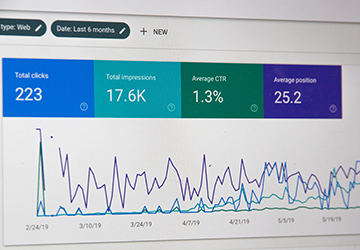Investing in the stock market always involves a degree of risk and unpredictability. Fundamental analysis and technical analysis are two proven investing techniques, but they can be subject to human bias and need help processing large amounts of data effectively and quickly.
While the stock market has always been volatile and unpredictable, the advent of artificial intelligence and big data has revolutionized investing. The stock market has changed dramatically as artificial intelligence and big data provide investors with powerful research, forecasting and decision-making tools.
Big data and artificial intelligence are having a major impact on investing. With these tools, investors can find undiscovered information, identify market patterns and act quickly on data. Applications of AI in the stock market include automated portfolio management, sentiment analysis, and algorithmic trading, among others.
Furthermore, the benefits are not only reserved for institutional investors or major financial organizations; now that ordinary investors have access to advanced tools and platforms, using artificial intelligence and big data to level the playing field, everyone can benefit.
The Role of Artificial Intelligence in Investing-
The creation of computer systems capable of performing activities that traditionally require human intelligence, such as B. speech recognition, visual perception, and decision-making, is known as artificial intelligence (AI). Extensive data analysis, pattern recognition, and predictive capabilities are all capabilities of AI systems.
Many industries, including banking, healthcare, and transportation, have adopted artificial intelligence techniques such as machine learning and natural language processing. Artificial intelligence is fundamentally changing the way investment decisions are made and executed in the stock market.

AI has fundamentally changed the way investors view the stock market. AI enables investors to make smarter judgments, execute trades with precision and maximize portfolio performance by leveraging its capabilities in sentiment analysis, algorithmic trading and automated portfolio management.
Key benefits of AI in investing-
l Speed and efficiency-
Artificial intelligence algorithms can analyze and process massive amounts of data in real time, enabling faster transaction execution and decision-making. This speed advantage is critical in today's fast-changing and highly competitive financial markets.
l Automatic trading-
Algorithms powered by artificial intelligence can quickly and accurately evaluate market data, identify trends and place trades. These algorithms can take into account price changes, trading volume and news sentiment to make informed trading decisions. Algorithmic trading can execute trades faster and in larger volumes than humans, increasing market liquidity and efficiency.
l Improved accuracy-
AI systems can impartially evaluate data, free from human bias, to provide more accurate predictions and insights. AI can find patterns and connections by considering multiple factors that are difficult for humans to see.
l Portfolio Management Application-
AI can help manage portfolios by continuously monitoring market conditions, examining individual securities, and rebalancing portfolios according to established investment strategies. AI-powered portfolio management systems can adapt to changing investor preferences and market conditions, optimizing asset allocation and maximizing profits.
l Large-scale data analysis-
Thanks to artificial intelligence, large volumes of organized and unstructured data such as financial records, market data, news articles and social media feeds can be analyzed. Investors can use this data-driven strategy to discover untapped insights, identify market patterns and make informed investment decisions.
l Sentiment Rating-
AI systems can examine news articles, social media feeds and other sources of information to determine market sentiment. Investors can make better choices by understanding market trends and public opinion. Sentiment research can be used to identify emerging risks, track changes in market sentiment and predict how markets will react to specific events.
l Risk assessment and management-
By examining historical data, market indicators, and external influences, AI can help assess risk by identifying potential threats and optimizing investment strategies. Investors using this proactive approach to risk management can reduce potential losses and improve portfolio performance.
Big Data and Its Impact on Investing-
Data accessibility has always been important in the investment world. However, with the introduction of big data, the environment has changed drastically. Using big data to analyze vast amounts of information and make smarter decisions opens up new opportunities for investors.
Big data refers to huge and complex data collections that are difficult to manipulate or analyze with traditional data processing tools. It differs from traditional data sources in scope, velocity and variety. Big data includes both organized (such as statistics and spreadsheets) and unstructured (such as social media posts, images, and videos). It provides a deeper understanding of the market and consumer behaviour.
How to use Big Data to revolutionise the Stock market?
Big data has had a major impact on the investment world. It expands the reach of investment research by providing access to vast amounts of data from multiple sources. Financial statements and economic indicators are still useful, but have certain limitations compared to traditional data sources.

Big data including website scrapes, news, customer reviews, and social media sentiment provide an additional layer of information. By providing more information, investors can make more informed judgments about their investments by understanding market trends, consumer behavior and company performance.
Here are some of the benefits of using Big data in investing-
l Data aggregation-
Collect large volumes of structured and unstructured data from various sources such as B. news articles, financial reports, social media, and online forums.
l Data processing-
Data is processed and analyzed using sophisticated analytical tools and algorithms to look for patterns, trends and correlations that provide important information to investors.
l Market analysis-
Conduct in-depth market research by analyzing big data in order to discover new trends, market sentiment, and customer behavior. This allows investors to choose investments with more knowledge.
l Predictive analysis-
Use big data analytics to create predictive models that predict future stock performance, market movements, and industry trends. This supports investors in making active investment decisions.
l Real-time monitoring-
Continuously monitor market conditions, news and social media using big data technology. This enables investors to keep up with market trends and react quickly to market conditions.
l Personal recommendation-
Leverage big data analysis to provide investors with personalized financial advice based on risk tolerance, investment goals and past performance. This makes it easier for investors to make informed investment choices.
Conclusion-
Thanks to artificial intelligence and deep data integration, the stock market has changed dramatically, creating new opportunities for investors. It improves the accuracy, speed and effectiveness of the investment decision-making process. Investors can use big data and artificial intelligence to make smarter and more strategic investment decisions, and ultimately affect the direction of the stock market.
